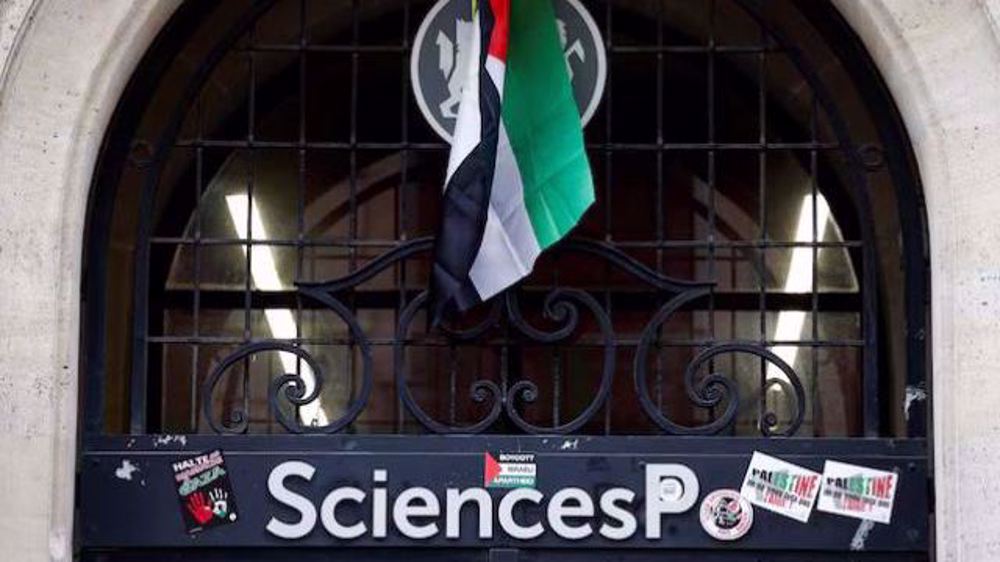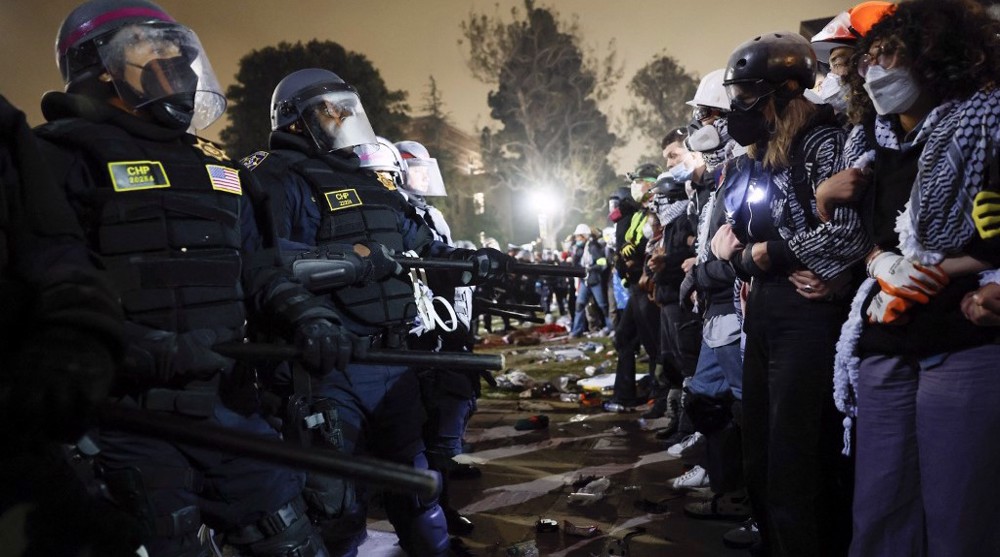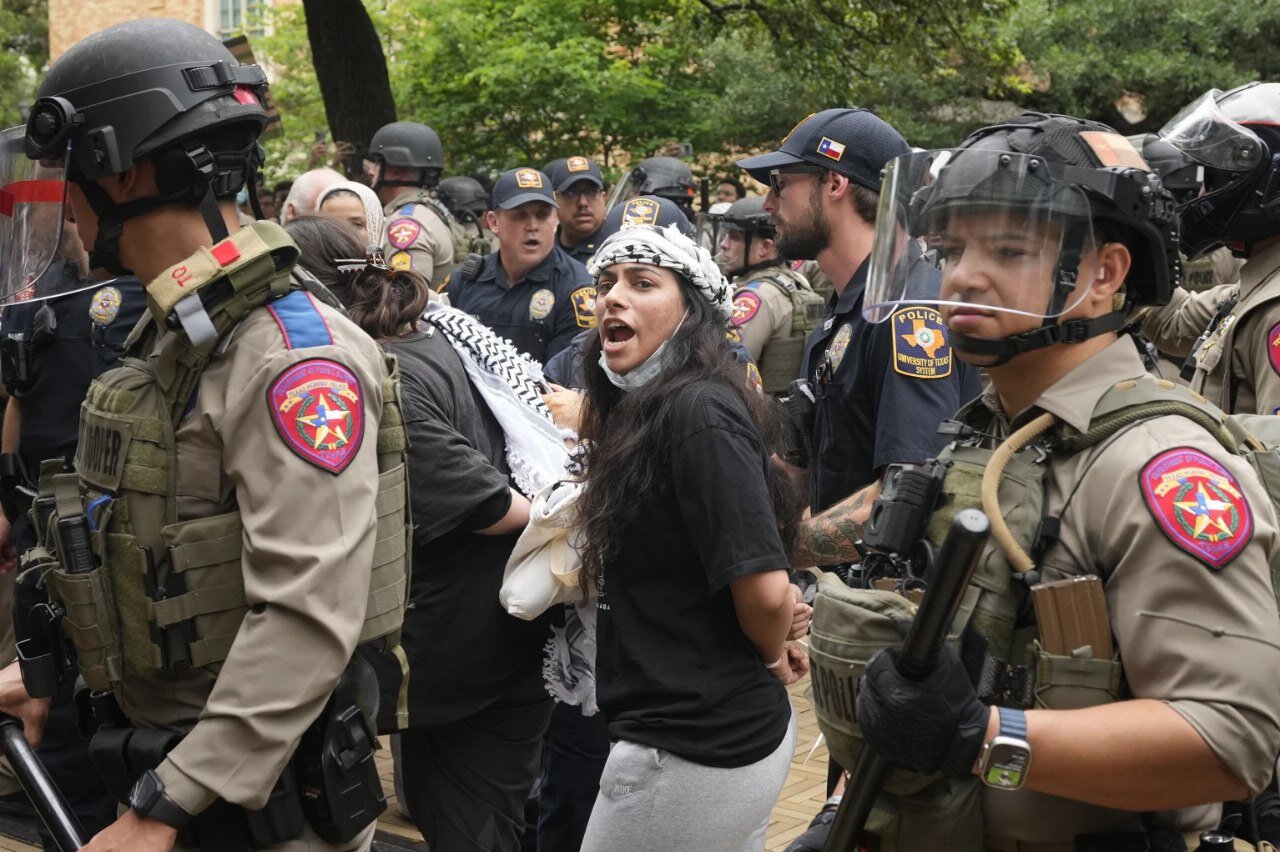01.05.2024
Tehran University professor Foad Izadi, one of the leading mouthpieces of the Iranian regime, discussed encampments in American college campuses on an April 26, 2024 show on Ofogh TV (Iran). He said that Iranians like what they see on the college campuses, but “it should not end with this.” Izadi continued to say that these students are “our people.” He added that if tensions between America an Iran rise, “these are the people who will have to take to the streets to support of Iran.”
Izadi said that Iran could potentially repeat what it did in Lebanon in greater measure, because its “Hizbullah-style” groups in America are “much larger” than in Lebanon. He further said that America is the Great Satan and Iran’s main enemy, but “we have hope.”
———————
After US, pro-Palestine student protests proliferate in Canada, France, Mexico, Australia
Friday, 03 May 2024 11:33 AM [ Last Update: Friday, 03 May 2024 11:40 AM ]

A general view of the building of the Sciences Po University where youths staged a sit-in in support of Palestinians, during Israel’s ongoing war on Gaza, in Paris, France, on April 26, 2024. (Photo by Reuters)
Pro-Palestine student protests have intensified in several countries across the world, including Canada, France, Mexico, and Australia, amid a crackdown on US students and a mounting death toll from Israel’s war on Gaza.
On Friday, dozens of students continued a sit-in in the main buildings of Sciences Po university in the French capital, Paris, after having spent the night there.
“By the way, the negotiations with leadership are making no progress,” Jack, one of the protesters, told Reuters in a text message, in reference to a debate between the institute’s leadership and students over the war and academic ties with Israel.
Sciences Po’s director on Thursday rejected demands by protesters to review the schools’ ties with Israeli universities.
According to a student speaking on behalf of the protesters, at least one person has gone on a hunger strike.
After the debate failed to ease tensions, Sciences Po university was closed for the day on Friday and its staff were asked to work from home, according to an internal memo cited by local newspaper Le Parisien and radio France Inter.
The elite political sciences university this week became the center of a wave of pro-Palestine protests at several French schools.
In Canada, more students have erected pro-Palestinian camps across some of the country’s largest
universities, including the University of Toronto, the University of British Columbia the University of Ottawa, and McGill University.
They demand the universities divest from groups with ties to Israel.
Quebec Premier Francois Legault said on Thursday the encampment at Montreal’s McGill should be dismantled.
“We want the camp to be dismantled. We trust the police, let them do their job,” a spokesperson for Legault said. The law enforcement said in a statement Thursday evening it was monitoring the situation.
On Thursday morning, students at the University of Toronto set up an encampment at the school’s downtown campus where nearly 100 protesters gathered with dozens of tents.
The organizers say the encampment will stay until the university discloses its investments, divests from any that “sustain Israeli apartheid, occupation and illegal settlement of Palestine” and cut ties with some Israeli academic institutions.

Pro-Palestine protests: US police violently clear UCLA encampment, student arrests reach 2,200
Also on Thursday, dozens of pro-Palestinian students camped out in front of the head office of the National Autonomous University of Mexico, the largest in the country, chanting “Long live free Palestine”.
They urged their government to break diplomatic and commercial ties with Israel, and voiced their support for their counterparts in the US.
“We are here to support Palestine, the people who are in Palestine, and the student camps in the United States,” Valentino Pino, a 19-year-old philosophy student, said.
Australia also saw protests in support of Palestine on Friday. At the University of Sydney, hundreds of pro-Palestinian protesters met dozens of supporters of Israel who are calling for the pro-Palestinian camp to be forcibly dismantled.
Pro-Palestinian demonstrators have been camped for 10 days in front of the University of Sydney’s sprawling Gothic sandstone edifice, a bastion of Australian academia. They also demand Sydney University to cut ties with Israeli institutions and reject funding from arms companies.
The camp’s organizers said they were inspired by the US protests.
New York’s Columbia University inspired “us to set up our own camp”, Deaglan Godwin, a 24-year-old arts and science student and one of the organizers, said.
He also noted that the protests at Columbia University, the scene of police crackdowns and mass arrests, were also a warning.
Columbia is “also now a warning, a warning that the government is willing to use quite lethal, brutal force in order to put down Palestinian protesters.”
The Pro-Palestine demonstrations began at Columbia University in New York City on April 17, and have spread across other campuses in the US in a student movement unlike any other this century.
US police arrested about 2,200 people during pro-Palestinian protests at college campuses across the country in recent weeks, the Associated Press reported.
The students are calling for an end to Israel’s genocidal war on Gaza and demanding schools divest from companies that support the Israeli regime.
Israel launched the war on Gaza on October 7 after the Palestinian resistance movement Hamas waged the surprise Operation Al-Aqsa Storm against the occupying entity in response to the Israeli regime’s decades-long campaign of bloodletting and devastation against Palestinians.
Tel Aviv has also blocked water, food, and electricity to Gaza, plunging the coastal strip into a humanitarian crisis.
Since the start of the offensive, the Tel Aviv regime has killed at least 34,596 Palestinians and injured 77,816 others.
Press TV’s website can also be accessed at the following alternate addresses:
—————————–
By Mona Hojat Ansari
U.S. police trained in Tel Aviv, served in Iraq
May 4, 2024 – 21:30 – Tehran Times
GU Professor says U.S. police background fuels violence against anti-Zionist protesters

TEHRAN – The scenes unfolding at American universities in the past two weeks have appalled people around the world who have been watching peaceful student protesters get violently arrested, beaten, and demonized by armed police.
Numerous U.S. professors have denounced administrators and law enforcement for treating anti-war college students as dangerous criminals, expressing shock and dismay at the unprecedented level of violence witnessed on campus.
To further understand the disproportionate police response to student protests, we spoke to Dr. Elliott Colla, associate professor of Arabic and Islamic Studies at Georgetown University, who suggested that the Islamophobic and anti-Palestinian sentiments prevalent within U.S. police ranks have contributed to their violent treatment of students advocating the Palestinian rights.
The full transcript of the interview is as follows:
Q: What is your perspective on the student protests currently taking place in universities across the U.S.? Do you believe they are predominantly peaceful or driven by antisemitism?
A: I have been following the protests directly and I have also closely inspected the ones taking place on our own campus. The protests are loud, the students stay up all night and they might even say some impolite things. But it is an absolute falsehood to assert that these protests are antisemitic. In fact, there are a lot of Jewish representatives who are taking part in the Gaza solidarity encampments because they don’t want Israel to kill Palestinians under their name. These American students have three main demands: they want a ceasefire in Gaza, they want the U.S. to end support for the Israeli military and finally, they want their universities to divest from Zionist entities. Many universities in the U.S. have invested in companies that help manufacture the missiles and bombs that have been raining on Palestinians in Gaza. I support the students’ call for universities to prioritize human rights over profit.
These students are simply asking to center Palestinian humanity, and that seems to have been difficult for Zionists to take in. It also makes perfect sense to cut ties with Israeli universities and halt student exchange programs, because the technologies developed by these schools are used to slaughter Palestinians.
I think in general, as Americans, we bear a bigger responsibility regarding the war in Gaza. Our tax dollars directly fund Israel’s military campaign in the enclave. To uphold moral and ethical principles on the global stage, we must cease supporting these unjust actions financially.
Q: How do you assess the authorities’ response to the protests? Do you believe their use of force has been justified and proportionate?
A: What we are seeing right now is shocking and appalling to most people working in universities. Administrators have decided to bring in armed riot police on their campuses to deal with their students. I think what’s been even more shocking is that universities were very swift to call in law enforcement. This quick resort to violence is thoroughly unjustifiable.
It is crucial to recognize that if students were to take legal action against these administrators in the future, they would likely win. The use of violence by universities against their own students is a clear violation of their own principles and conventions.
Also, it is worth noting that law enforcement agencies in the United States often exhibit Islamophobic and anti-Palestinian attitudes. This can be attributed to the fact that many police officers are veterans who served in places like Iraq and Afghanistan. Additionally, there is evidence to suggest that U.S. police forces receive training in Tel Aviv, leading to a similar hostile and racist approach towards Palestinians as seen in Israeli forces.
Moreover, we have witnessed something unprecedented in recent days. We saw that in some universities, large groups of trained thugs were allowed to enter campuses, attack the students, and rampage encampments while police stood by and did nothing. So, universities first got law enforcement to repress students, and then let local Zionist militia assault them.
Q: In your opinion, does the U.S. government need to reassess its policies regarding the Palestinian issue? If so, what changes would you advocate for?
A: I agree with the students that our nation is failing in its pursuit of a multicultural democracy. It is paradoxical to strive for inclusiveness while simultaneously supporting an apartheid government that is committing genocide.
The truth of the matter is that Israel will only try to change its behaviors once it is being forced to pay its bills. Israelis will not change on their own. Israel is a century-old colonial project that has progressively drifted toward the extreme right. We must force them to change by pulling the plug on them or there will be none.
RELATED NEWS
- ‘American students have been betrayed’
- Operation Al-Aqsa Storm was an awakening for the world: MP
- Iranian students rally to support Gaza solidarity demonstration in U.S.
